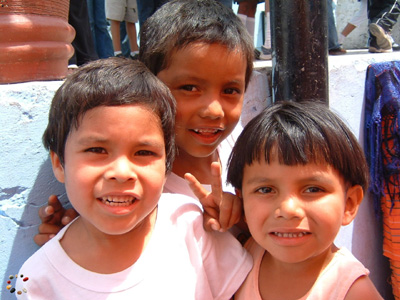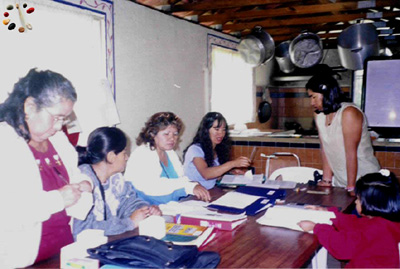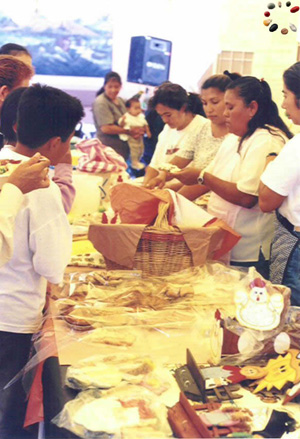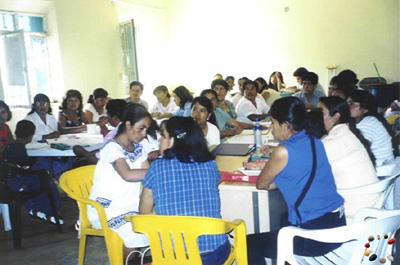|
May 1, 2006
Presenting: Pablo Buitron from Fundacion
Comunidad - Helping Women Help Themselves in the Mexican State
of Morelos
During my stay in Cuernavaca I had the opportunity to meet several
people from different community organizations that are involved
in helping local disadvantaged people.
Pablo Buitron is the General Coordinator of Fundacion
Comunidad, an organizationt that dedicates itself to co-investing
in initiatives that help the most vulnerable groups in the Mexican
State of Morelos. In particular, his group works a lot with local
disadvantaged and indigenous women to help them build small business
and community projects and empower them along the way.
In this interview Pablo will explain to us what his community foundation,
Fundacion Comunidad, is all about.
1. Please tell us about yourself and your background. What
is your involvement with Fundacion Comunidad?
I have a PH.D. in management form the University of Texas, my field
of specialty is entrepreneurship. In 2001 I started working for
Comunidad as a board member, since January I am the general coordinator
(main operating officer).

2. Who came up with the idea of Fundacion Comunidad
and how did it get started? Please tell us about the history of
Fundacion Comunidad.
Fundacion Comunidad was started in the USA. In 1996 a
special project was started, with help from the World Bank. Gabriela
Videla, our founder, had 30 years of experience in the social sector,
when she found out about the idea, she approached CEMEFI, the Mexican
Center for Philantrophy, in order to get help to start Comunidad.
In 1996 the charter for Comunidad was established.
3. Please tell us a bit about the situation in the social
sector and in communities in the Mexican state of morelos. What
are some of the greatest needs in the communities you work with?
Compared to Canada, people in rural areas are very, very poor.
However, we do not like to use the term "needs". We rather
use "assets", since we believe that needs are endless,
but passive, while assets are active in terms of solving problems.
We work mainly with groups established by women (since many men
emigrate to the US) and help them to become formal groups to solve
issues related to education, health, nutrition, gender issues, regional
development, etc.
4. What general areas does your foundation get involved
in?
We help groups that aim to improve the situation of women, kids
and youngsters, handicapped people, in areas of education, health,
nutrition, gender issues, regional development, etc.

5. Who are the people that you work with? Who are the beneficiaries
of your projects?
Mainly we work with women and kids, we do not use the term "beneficiaries"
(we are the real "beneficiaries" since we gain so much
in terms of learning and sensibility)
6. How is the money raised and how is it allocated?
We approach international, national and local donors, at the present
time, about one third of our funds come from each source: however,
we are trying to increase the local funds. The money is allocated
about 80 to 85% to projects, 5% to the patrimonial fund, and 10
to 15% to the operational fund.
7. Please give us some specific samples of some of the
projects that fundacion comunidad has been involved in.
Here are some examples:
- training of a group of women in Totolapan, where they were first
trained in traditional medicine techniques, and later they are selling
their products, such as shampoos, creams, soaps, etc.
- training of youth community promoters, in which junior high schoolers
learn to identify the main problems in their community, and then
create and implement proposals for solving these problems
- environmental education, where families are trained in recycling
and reusing techniques, this helps them improve their living conditions
- training in artistic techniques for the creation and marketing
of products by the interns at the Atlacholoaya Federal Readaptation
Center
- nutritional care of children up to 5 years of age, where mothers
are taught better ways to feed their children, for example, using
soy as a cheap but very nutritional alternative, and their children's
height and weight are monitored every week.

8. What have been some of the results that Fundacion
Comunidad
has achieved in the 10 years that it has been in existence?
We have worked with 77 groups, invested almost a million and a
half US$, and worked with 40,000 people. We have built several school
kitchens, libraries, and health centers. We feel we are making a
difference in Morelos, since more and more women, including indigenous
women, are becoming more active in solving community problems.
9. Please comment specifically on some of the women's micro
enterprise initiatives you have been involved in. What is the situation
of women in your community and how are you helping them?
Probably we are helping women become in charge of themselves, almost
all the projects (health, education, employment, etc.) we help are
headed by women. In a state where "machismo" is still
rampant, we feel women appreciate our help in order to become self
reliant.
10. Please tell us about the radio programs that you are
involved with.
We currently have a radio program, perhaps the only one in Mexico,
directed at handicapped older adults. We are currently starting
a program on corporate social responsibility.
11. How do you promote the cause of corporate social responsibility?
In several ways, perhaps we feel we are the most effective and
efficient space for companies to invest in community causes.
12. How can we contribute?
By being close to us, by having this interview, by helping us to
get in touch with potential donors, but, since we are looking to
become a local beacon, just by being in touch and letting us know
we are not alone!
Thank you, Pablo, for telling us about your local initiatives.
Your
organization makes such a great difference to the local community
and we wish you all the best for all your efforts!

Useful Books:
Related Articles:
Mexico 2006 - My cultural immersion
experiment
Hello from Mexico City - First impressions
Hello from Mexico City - A skyscraper,
a little horse and a government pawn shop
Hello from Mexico City - The Zócalo,
the Cathedral, a healing ritual and a university dedicated to a
16th century female poet
Hello from Mexico City - A relaxing
evening in Coyoacán
Hello from Mexico City - Exploring the
Paseo de la Reforma, de Bosque de Chapúltepec and a nice
evening in San Angel
Hello from Cuernavaca - Arrival and
first impressions
Hello from Cuernavaca - Getting to know
my B&B hostess Marta Elena: A true riches to rags story
Hello from Cuernavaca - My first day
learning Spanish and two local icons: the Robert Brady Museum and
the Jardín Borda
Hello from Cuernavaca - A lovely dinner
in a garden paradise
Hello from Cuernavaca - An excursion
to Las Estacas, checking out orchids and a meeting at El Cafecito
Hello from Cuernavaca - An excursion
to Lake Tequesquitengo and a visit to the doctor
Hello from Cuernavaca - A conversation
with Andy Grater, local B&B owner and President of the Newcomers
Club
Hello from Cuernavaca - A presentation
about ecology at the Newcomers Club Meeting
Hello from Cuernavaca - Opening of a
South African photo exhibition and a visit to the Palacio de Cortés
Hello from Taxco - The city that silver built
Hello from Taxco during Semana Santa - The
famous Palm Sunday Procession
Hello from Cuernavaca - A new language
school, visiting 'Casa Vamos' and an evening with a very sad ending
Hello from Cuernavaca - My most intense
day: more language studies, 3 interviews, a guided eco-hike and
dinner at the Marco Polo
Hello from Cuernavaca - A day outing
to the enchanting mythical village of Tepoztlan
Hello from Cuernavaca - My last day
of school and a visit to Cuernavaca's Spring Fair
Hello from Taxco - An eerie experience: Visiting
Taxco's famous Good Friday procession
Hello from Taxco and Cuernavaca - Interviewing
one of the penitentes and enjoying my last day in Mexico
Related Interviews:
Presenting:
Ruben Córtes from Morelos Trails - Local adventure sports
and cultural guided tour operator, expert on Morelos and Cuernavaca
Presenting: Pablo
Buitrón from Fundacion Comunidad, helping local
women empower themselves
Presenting: Jorge Torres from
the Cetlalic Alternative Language School - Learning Spanish with
cultural, social and political awareness
Presenting: Hermilo Brito
from the Ideal Language School - Making Spanish learning fun
Helpful links:
Mexico
Tourism Information
State
of Morelos Tourism Organization
Official
website of the City of Cuernavaca tourism
|